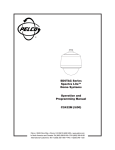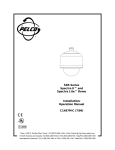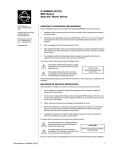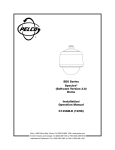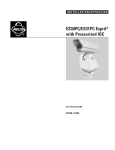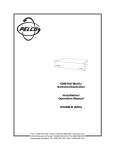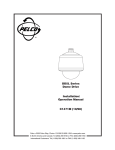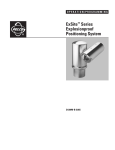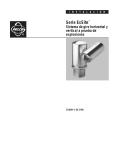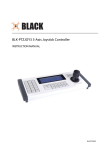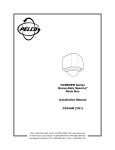Download Pelco SD5AM User's Manual
Transcript
® SD5BC Series Color or SD5AM Series Monochrome Spectra II™ Dome Systems Operation and Programming Manual C2419M-A (5/00) Pelco • 3500 Pelco Way • Clovis, CA 93612-5699 USA • www.pelco.com In North America and Canada: Tel (800) 289-9100 • FAX (800) 289-9150 International Customers: Tel +1(559) 292-1981 • FAX +1(559) 348-1120 CONTENTS Section Page IMPORTANT SAFEGUARDS AND WARNINGS ................................................................ 3 OPERATION ...................................................................................................................... 4 POWER-UP DISPLAY ............................................................................................... 4 HOW TO OPERATE YOUR SPECTRA II LOWLIGHT COLOR OR MONOCHROME DOME ........................................................................................ 4 OPERATING NOTES ................................................................................................. 5 PAN AND TILT FUNCTIONS .............................................................................. 5 AUTO FLIP ......................................................................................................... 5 SCAN SPEED .................................................................................................... 5 PRESET FUNCTIONS ....................................................................................... 5 RANDOM, FRAME, AND AUTO SCANNING .................................................... 5 ZONES ............................................................................................................... 5 PATTERNS ........................................................................................................ 6 ALARMS ............................................................................................................ 6 AUXILIARY OUTPUTS ...................................................................................... 7 PARK .................................................................................................................. 7 AUTO IRIS ......................................................................................................... 7 PROGRAMMING ............................................................................................................... 8 PROGRAMMING GUIDE - SPECTRA II LOWLIGHT COLOR, SPECTRA II MONOCHROME ............................................................................... 8 ACCESSING MAIN MENU (PRESET 95) .................................................................. 9 ALARMS ................................................................................................................... 10 ALARM DWELL ........................................................................................................ 10 ALARM PATTERN .................................................................................................... 10 ALARM PRIORITY .................................................................................................... 11 ALARM RESUME ..................................................................................................... 11 AUTO FLIP ................................................................................................................ 12 AUTO FOCUS MODE ............................................................................................... 12 AUTO IRIS ................................................................................................................ 13 AUX MODE ............................................................................................................... 14 BACKLIGHT COMPENSATION ................................................................................ 14 GAIN/AGC ................................................................................................................. 15 AGC MODE ...................................................................................................... 15 GAIN ................................................................................................................. 15 LIMIT STOPS ............................................................................................................ 16 TURNING LIMIT STOPS ON OR OFF ............................................................. 16 PROGRAMMING LIMIT STOPS ....................................................................... 16 Manual Limit Stops ................................................................................... 16 Scan Limit Stops ....................................................................................... 16 LINE SYNCHRONIZATION ....................................................................................... 17 LOWLIGHT LIMIT (COLOR CAMERA ONLY) .......................................................... 18 PARK TIME MINUTES .............................................................................................. 18 PATTERN LENGTH .................................................................................................. 19 POWER-UP MODE ................................................................................................... 19 PROPORTIONAL PAN .............................................................................................. 20 RESET CAMERA ...................................................................................................... 21 SCAN SPEED ........................................................................................................... 22 SHARPNESS ............................................................................................................ 22 SHUTTER SPEED .................................................................................................... 23 WHITE BALANCE (COLOR CAMERA ONLY) .......................................................... 24 ZONES ...................................................................................................................... 24 ZONE BLANK ........................................................................................................... 25 ZOOM LIMIT ............................................................................................................. 25 MAINTENANCE ................................................................................................................ 26 DOME CLEANING .................................................................................................... 26 SERVICE MANUAL .................................................................................................. 26 SPECIFICATIONS ............................................................................................................. 26 WARRANTY AND RETURN INFORMATION .................................................................... 28 2 Pelco Manual C2419M-A (5/00) IMPORTANT SAFEGUARDS AND WARNINGS Prior to installation and use of this product, the following WARNINGS should be observed. 1. Installation and servicing should only be done by qualified service personnel and conform to all local codes. 2. Unless the unit is specifically marked as a NEMA Type 3, 3R, 3S, 4, 4X, 6, or 6P enclosure, it is designed for indoor use only and it must not be installed where exposed to rain and moisture. 3. Only use replacement parts recommended by Pelco. 4. After replacement/repair of this unit’s electrical components, conduct a resistance measurement between line and exposed parts to verify the exposed parts have not been connected to line circuitry. 5. The installation method and materials should be capable of supporting four times the weight of the enclosure, pan/tilt, camera and lens combination. The product and/or manual may bear the following marks: This symbol indicates that dangerous voltage constituting a risk of electric shock is present within this unit. This symbol indicates that there are important operating and maintenance instructions in the literature accompanying this unit. CAUTION: RISK OF ELECTRIC SHOCK. DO NOT OPEN. Please thoroughly familiarize yourself with the information in this manual prior to installation and operation. MEASURES DE SECURITE IMPORTANTES Avant d’installer ou d’utiliser ce produit, les mesures de sécurité suivantes sont à prendre: 1. Toute installation et réparation devraient être entreprises par un technicien qualifié et conformes au codes locaux. 2. A moins que cet equipement indique avoir un boitié agrée NEMA de type 3, 3R, 3S, 4, 4X, 6 ou 6P, il est uniquement conçu pour utilisation intérieure et ne peut donc pas être en contact de pluie ou d’humidité. 3. Utiliser seulement les pièces de rechanges recommandées par Pelco. 4. Après toute installation ou réparation de la partie électrique de ce produit, une résistance entre le courant et la partie exposée devrait être installée afin de vérifier que la partie électrique n’aie pas été en contact d’un court circuit. 5. L’installation entreprise et le matériel utilisé devraient supporter quatre fois le poids du boitié, de la tourelle, de la caméra, et de la lentille. Ce produit et/ou le manuel pourrait inclurent les symbols suivants: Ce symbol indique qu’un voltage dangereux pouvant provoquer un chock électrique est présant dans cette unité. Ce symbol indique qu’il y a des mesures d’installation et d’entretient importantes inclus dans le manuel de cet équipement. CAUTION: RISQUE DE CHOQUE ÉLECTRIQUE. NE PAS OUVRIR. Nous vous prions de bien vous familiarisez avec la manuel avant d’entreprendre toute installation. Pelco Manual C2419M-A (5/00) 3 OPERATION POWER-UP DISPLAY When the Spectra II™ dome is powered up, the selected protocol, revision number, and other information is displayed on the monitor. For example, the screen might show the following information: PELCO SPECT II 4.0 CONFIGURE DONE Protocol C The information displayed depends on the selected protocol (C, D, or P) and the menu selection for powerup mode. (Refer to the Power-Up Mode in the Programming section). The information remains on the monitor until the dome is moved. HOW TO OPERATE YOUR SPECTRA II LOWLIGHT™ COLOR OR MONOCHROME DOME Operation How to Control Pan and Tilt Move joystick left/right and up/down. Scanning Stop Scan Random Scan Frame Scan Auto Scan Zoom Far Preset 96 Preset 97 Preset 98 Preset 99 To zoom far, do the following: 1. Press the Zoom Tele button or turn the joystick clockwise until you have the picture you want or you reach the optical zoom1 limit. 2. Release the button or joystick. 3. To continue zooming (digitally), immediately press the button or turn the joystick clockwise again until you have the picture you want or you reach the digital zoom2 limit. Zoom Wide Press the Zoom Wide button or turn the joystick counterclockwise. Presets Refer to the documentation supplied with the controller. Patterns3 Refer to the documentation supplied with the controller. Zones Refer to the Programming section and to the documentation supplied with the controller. Alarms Refer to Alarms in the Operating Notes and in the Programming section. Auto Flip Turn on or off in the programming menu. Refer to the Programming Guide in the Programming section. 1 2 3 Optical zoom magnifies the image and the picture remains clear. Resolution is constant. Digital zoom magnifies the image and the picture may appear pixilated. The larger the zoom limit the greater the reduction in resolution. The Spectra II LowLight Color camera cannot do electronic zoom in a pattern. Optical zoom will operate in a pattern. For more information, refer to Operating Notes. 4 Pelco Manual C2419M-A (5/00) OPERATING NOTES PAN AND TILT FUNCTIONS Controller Type Fixed speed Variable speed Turbo Mode Preset Mode Pan Speed determined by controller 0.1 to 80° per second, depending on joystick position 150° per second 250° per second Tilt Speed determined by controller 0.1 to 40° per second, depending on joystick position 200° per second Does not affect the tilt speed If the proportional pan mode is enabled (refer to Proportional Pan in the Programming section), the pan and tilt speeds will depend on the amount of zoom. At telephoto zoom settings, the pan and tilt speeds will be slower for a given amount of joystick deflection than at wide zoom settings. This keeps the image from moving too fast on the monitor when there is a large amount of zoom. This slowing does not happen when going to a preset, but does occur in turbo mode when high zoom is selected. The minimum pan and tilt speeds are 0.1 degree per second at full zoom. AUTO FLIP When the camera tilts downward and goes just beyond the vertical position, the dome rotates 180 degrees. When the dome rotates (flips), the camera starts moving upward as long as you continue to hold the joystick in the down position. Once you let go of the joystick after the dome rotates, joystick control returns to normal operation. The auto-flip feature is useful for following a person who passes directly beneath the camera. Refer to Auto Flip in the Programming section. SCAN SPEED Scan speed is adjustable from 1 to 40 degrees per second through the programming menu. PRESET FUNCTIONS NOTE: For American Dynamics controllers with only 32 presets, set switch SW1-7 on the dome drive in the ON position. When SW1-7 is ON, preset 99 becomes 32 98 becomes 31 97 becomes 30 96 becomes 29 95 becomes 28 93 becomes 26 92 becomes 25 91 becomes 24 90 becomes 23 If the limit stops are turned off (refer to the Limit Stops section), presets 23-26 can be used as regular presets. Pelco Manual C2419M-A (5/00) The Spectra II dome is capable of going to 64 preset locations, each with a 20-character label. The presets are numbered 1-32 and 35-66. Refer to the documentation for your control system for programming presets. When a preset operation is performed, the amount of error in moving to the pan and tilt position is 1/2 degree. If you command the dome to go to an undefined preset, erratic operation may result. Presets 33 and 34 are fixed commands, meaning that you cannot program them. Preset 33 is the “flip” command, which will pan the dome drive 180 degrees. Preset 34 is the “pan zero” command, which will direct the dome drive to the factory-determined zero reference point. RANDOM, FRAME, AND AUTO SCANNING Call preset 97 (30) to start random scanning. Call preset 98 (31) to activate frame scanning (three seconds of scanning followed by a three-second pause). Call preset 99 (32) to start auto (continuous) scanning. Scan limit stops are controlled by software. Refer to the Limit Stops section to program the scan limit stops. When the dome reaches a scan limit stop, it reverses direction. Call preset 96 (29) to stop a scan. Any pan/tilt or lens command also will stop a scan. ZONES The Spectra II dome is capable of eight zones, each with a 20-character label. Depending on the controller, you can define the zone size and define any zone as “blanked” for video when the camera pans into the zone area. If zone labels are turned off, the system displays the message, VIDEO BLANK, to indicate the video is being blanked and is not failing. (Refer to Zone Blank in the Programming section for instructions.) 5 PATTERNS NOTE: The Spectra II LowLight Color camera cannot do electronic zoom in a pattern. Optical zoom will operate in a pattern. The Spectra II dome can do either one full pattern (1.5, 3, or 6 minutes long) or two half patterns (.75, 1.5, or 3 minutes long). This pattern can consist of any standard pan and tilt or lens command. Presets, flip, and turbo are not allowed in a pattern. Zone scan can be enabled while running a pattern. Refer to the documentation for your control system to program and run patterns. ALARMS The Spectra II dome has seven alarm inputs, which can be designated as either high or low priority through its programming menu. When an alarm is received, the dome does one of the following: • Moves to the preset position that corresponds to the alarm number. For example, if alarm 3 is activated, the dome moves to preset 3. • Runs a half pattern or full pattern as programmed in the Alarm Pattern menu. • If the activated alarm inputs have the same priority–all low or all high–then the dome will sequence between the presets that correspond to the alarm numbers. • If the activated alarm inputs have different priorities–for example, one is high and four are low–the dome goes only to the high. It remains fixed on the high and only goes to the low after the high has been cleared. In certain situations, the dome will respond as follows: • If a preset has not been set, but an alarm is connected, the dome will go to a factory preset that will not be the desired position. • If one alarm is a preset and another is a pattern and both are received, the dome will alternate between them. An alarm clears by returning to its former (off) state. Depending on choices made on the programming menu, the dome can respond to an alarm by running one of the patterns below. (Refer to Patterns in the Programming section for more information.) • • • Run full pattern Run half pattern 1 Run half pattern 2 When sequencing between presets, the dwell time depends on the time set on the Alarm Dwell menu for that preset. After the dwell time expires, the dome immediately does one of the following: • If the resume feature was selected on the programming menu and there are no other alarms activated, the dome resumes its prior activity. So, it might return to its previous position or resume a scan or pattern. • If there are other alarms activated, the dome goes to them. If you move the joystick to pan or tilt the dome, or if you issue a lens command while there is an alarm, the pan and tilt or lens command overrides the alarm. Sixty seconds after the last pan and tilt or lens command, the dome will return to the alarm preset if the alarm is still active. 6 Pelco Manual C2419M-A (5/00) AUXILIARY OUTPUTS An AUX 1 command from the controller will activate the relay in the dome and operate the device that is connected to the relay. The relay will remain latched until a clear command is issued. An AUX 2 command from the controller will place a ground at the output of AUX 2 to operate the device that is connected to it. The output will remain latched until a clear command is issued. The output relay can also be programmed so that it is activated when any alarm input is activated. When latching (toggling) is selected on the programming menu, giving the AUX 1 command from the controller changes the state of the AUX (for example, if it was on, this turns it off.) The clear command from the controller will turn the AUX off in the latching or toggle mode. PARK If the dome does not receive any commands for a specified period of time (refer to Park Time Minutes in the Programming section), the dome will go to preset 1 and park. If the time specified is zero, or if preset 1 has not been programmed, the dome will not park. The default is zero minutes. AUTO IRIS If auto iris is in the auto mode, it remains that way until you manually open or close the iris. The dome will return to auto iris when it is panned or tilted more than 15 degrees. If there is not enough light for a good picture when the iris is wide open, you can increase the gain of the camera to improve the picture. To increase the gain: 1. Hold down the Iris Open button until the iris is wide open. 2. Release the button. 3. Within one second, hold down the button again. This starts increasing the camera gain. Hold down the button until a desirable picture is obtained or the maximum gain is reached. Pelco Manual C2419M-A (5/00) 7 PROGRAMMING Programming Guide - Spectra II LowLight Color Spectra II Monochrome Gain/AGC Menu 1. 2. Access main menu (preset 95). Make main menu selections. Joystick: Move up or down to position cursor or to toggle between selections. Iris Open: Enter Camera Menu Iris Close: Cancel Backlight comp Zoom limit Reset camera <Gain/AGC> <Auto-iris> <Next> Exit AGC mode Gain Exit Auto 0 Off x- - Auto-Iris Menu Auto-iris mode Auto-iris level Auto-iris peak Exit Line Sync Menu Auto 110 16 Sharpness Menu MAIN MENU <Camera> <Line Sync> <Power Up> <Aux> <Alarms, Zone Blank> <Other> EXIT Line sync Line sync phase Exit On 0 LowLight limit* 2 Shutter speed Auto Auto focus mode Auto <Sharpness> <White balance>* Prev (back to prev. menu) Exit Power-Up Menu Power Up Exit Default Alarm Priority Menu PRESETS The following presets are reserved for special functions. Preset 1 1-7 33 34 90-91 92-93 95 96 97 98 99 Function Park Alarms, if used Flip command Pan zero command Manual limit stops Scan limit stops Select camera programming menu Stop a scan Random scanning Frame scanning Start auto scanning * Spectra II LowLight Color only Alarm Aux Menu 1 2 3 4 5 6 7 Low Low Low Low Low Low Low On 13 White Balance Menu* Auto white bal R-B white bal M-G white bal Exit On --- Exit Aux 1 mode Aux 2 mode Exit Normal Normal Alarm Pattern Menu Alarm Alarms, Zone Blank Menu Alarm resume Alarm dwell sec <Alarm priority> <Alarm pattern> <Zone blank> Exit Off 5 Other Menu Auto flip On Proportional pan On Limit stops On Park time minutes 0 Scan speed deg/s 25 Pattern length 6 min Exit 8 Auto sharpness Sharpness Exit Next Menu 1No Pattern 2No Pattern 3No Pattern 4No Pattern 5No Pattern 6No Pattern 7No Pattern Exit Zone Blank Menu Video Blank Zone 1Off 2Off 3Off 4Off 5Off 6Off 7Off 8Off Exit For detailed instructions, refer to the following sections. Menu items are listed alphabetically. Pelco Manual C2419M-A (5/00) ACCESSING MAIN MENU (PRESET 95) NOTE: For American Dynamics controllers with only 32 presets, set switch SW1-7 on the dome drive in the ON position. When SW1-7 is ON, preset 99 becomes 32 98 becomes 31 97 becomes 30 96 becomes 29 95 becomes 28 93 becomes 26 92 becomes 25 91 becomes 24 90 becomes 23 If the limit stops are turned off (refer to the Limit Stops section), presets 23-26 can be used as regular presets. You can call up the main menu on your monitor by programming (setting or creating) preset 95 (28 if in 32-preset mode). Programming preset 95 for Pelco’s controllers varies according to the type of controller you are using. Instructions for programming preset 95 are given below for various Pelco controllers. CM6700 1. 2. 3. Enter the number of the Spectra II or Spectra Lite camera and press the CAM key. Enter 95 and hold the PRESET key for two seconds. In the Edit Preset menu, arrow to SET and press the ACK key. The main menu appears. KBD200/KBD300/KBD300V (Direct Mode Only) 1. 2. Enter 95. Hold the PRESET key (approximately 5 seconds) until the main menu appears on the screen. CM8500 1. 2. 3. Enter the number of the Spectra II or Spectra Lite camera and press the CAM key. Highlight PRESET in the Camera menu and hold down the joystick button until the Set Presets prompt appears. Enter 95 and press the PRESET key. The text editor appears. Select ENTER and the main menu appears. CM9500 1. 2. 3. 4. 5. Enter the number of the Spectra II or Spectra Lite camera and press the CAM key. The Main menu appears. Highlight SETUP in the Main menu and press the SELECT key. Highlight CAM in the Setup menu and press the SELECT key. Highlight PRESET in the Camera menu and press the SELECT key. Enter 95 and press the F1 key. The main menu appears. CM9750 1. 2. 3. 4. 5. Turn the KEY SWITCH to the ON position. Press the PROG key. PROGRAM appears on the LCD display. Press the PRES key. The PRESET prompt appears. Enter 95 and press the ENTER key. The main menu appears. Turn the KEY SWITCH to the OFF position. CM9760 1. 2. 3. 4. Press the ESCAPE key to open the Main menu. Select DEF. The Define Menu appears. Enter your four-digit PIN if this is your first time entering this mode. Enter 95 and select PRST. The main menu appears on the monitor. Select the Quit icon to return to the default menu. KBD4000/KBD4002/KBD4000V 1. 2. Press the SPOT MONITOR key. Enter 95, then hold the PRESET key (approximately five seconds) until the main menu appears on the screen. MPT9500 Standard Coaxitron Mode 1. Enter 95 and press the PRESET SET key. 2. Position the asterisk in the YES row and press the F1 key. The main menu appears. Extended Coaxitron or RS-485 Mode 1. Enter 95 and press the PRESET SET key. 2. Press the F2 key. The main menu appears. Pelco Manual C2419M-A (5/00) 9 ALARMS The Spectra II dome has seven alarm inputs, which can be designated as either high or low priority. The high priority setting is significant when more than one alarm is activated. If priority in alarms is not required, leave all alarms in the low setting. Refer to the Alarm Priority section. If presets 1-7 are not used for alarms, they can be used as regular presets. However, if they are being used for alarms, they should not be used for anything else. Also refer to the Alarm Dwell, Alarm Pattern, Alarm Resume, and Pattern Length sections to program alarm conditions. ALARM DWELL Main Menu Alarms, Zone Blank Menu <Camera> <Line Sync> <Power Up> <Aux> <Alarms, Zone Blank> <Other> EXIT Alarm resume Alarm dwell sec <Alarm priority> <Alarm pattern> <Zone blank> Exit Off 5 This is the minimum time the Spectra II will stay at an alarm even if the alarm is present for less than this amount of time. To change the alarm dwell: 1. Program preset 95 (28). The main menu appears. 2. Position the cursor (>) beside Alarms, Zone Blank. 3. Press the Iris Open button to enter the Alarms, Zone Blank menu. 4. Position the cursor (>) beside Alarm Dwell Sec. 5. Press the Iris Open button. The cursor moves to the right, beside the number of seconds for the alarm dwell time. 6. Move the joystick up or down and hold to cycle through 1-200 seconds in one-second increments. 7. SELECT - Press the Iris Open button on your keyboard to select your choice. CANCEL - Press the Iris Close button if you do not want to change the setting. ALARM PATTERN Main Menu <Camera> <Line Sync> <Power Up> <Aux> <Alarms, Zone Blank> <Other> EXIT NOTE: Pattern length is set on the secondary menu entitled Other. NOTE: To make the pattern run to its end when an alarm activates it, make alarm dwell time longer than pattern length. Thus, if the alarm goes away before the end of the pattern, the pattern will continue until the dwell times out. 10 Alarms, Zone Blank Menu Alarm resume Alarm dwell sec <Alarm priority> <Alarm pattern> <Zone blank> Exit Off 5 Alarm Pattern Menu Alarm 1No Pattern 2No Pattern 3No Pattern 4No Pattern 5No Pattern 6No Pattern 7No Pattern Exit You can choose one of the following for each of the seven alarm inputs: Full Pat (run full pattern) Half Pat 2 (run half pattern 2) Half Pat 1 (run half pattern 1) No Pattern In response to an alarm, the Spectra II dome can do either one full pattern (1.5, 3, or 6 minutes long) or two half patterns (.75, 1.5, or 3 minutes long). To change the alarm pattern: 1. Program preset 95 (28). The main menu appears. 2. Position the cursor (>) beside Alarms, Zone Blank. 3. Press the Iris Open button to enter the Alarms, Zone Blank menu. 4. Position the cursor (>) beside Alarm Pattern. 5. Press the Iris Open button to enter the Alarm Pattern menu. Pelco Manual C2419M-A (5/00) NOTE: The Spectra II LowLight Color camera cannot do electronic zoom in a pattern. Optical zoom will operate in a pattern. 6. 7. 8. 9. Position the cursor (>) beside the number of the alarm input for which you want to set the pattern. Press the Iris Open button. The cursor moves to the right, beside the words Full Pat, Half Pat 1, Half Pat 2, or No Pattern. Move the joystick up or down to toggle between the choices. SELECT - Press the Iris Open button on your keyboard to select your choice. CANCEL - Press the Iris Close button if you do not want to change the setting. ALARM PRIORITY Alarms, Zone Blank Menu Main Menu <Camera> <Line Sync> <Power Up> <Aux> <Alarms, Zone Blank> <Other> EXIT Alarm resume Alarm dwell sec <Alarm priority> <Alarm pattern> <Zone blank> Exit Off 5 Alarm Priority Menu Alarm 1 2 3 4 5 6 7 Low Low Low Low Low Low Low Exit This feature lets you set alarm priority inputs as one of the following: High - A high priority alarm will not release to a low priority alarm. Low - Alarms will release or sequence between low priority alarms only if no high priority alarm exists. To change alarm priority: 1. Program preset 95 (28). The main menu appears. 2. Position the cursor (>) beside Alarms, Zone Blank. 3. Press the Iris Open button to enter the Alarms, Zone Blank menu. 4. Position the cursor (>) beside Alarm Priority. 5. Press the Iris Open button to enter the Alarm Priority menu. 6. Position the cursor (>) beside the number of the alarm input for which you want to set the priority. 7. Press the Iris Open button. The cursor moves to the right, beside the word High or Low. 8. Move the joystick up or down to toggle between the words High and Low. 9. SELECT - Press the Iris Open button on your keyboard to select your choice. CANCEL - Press the Iris Close button if you do not want to change the setting. ALARM RESUME Main Menu <Camera> <Line Sync> <Power Up> <Aux> <Alarms, Zone Blank> <Other> EXIT Alarms, Zone Blank Menu Alarm resume Alarm dwell sec <Alarm priority> <Alarm pattern> <Zone blank> Exit Off 5 This mode lets the dome resume its previous activity (scan, pattern, or previous position) after all alarms are cleared. There are two alarm resume modes: On - Alarm resume mode is enabled. Off - Alarm resume mode is disabled. To change the alarm resume mode: 1. Program preset 95 (28). The main menu appears. 2. Position the cursor (>) beside Alarms, Zone Blank. 3. Press the Iris Open button to enter the Alarms, Zone Blank menu. 4. Position the cursor (>) beside Alarm Resume. 5. Press the Iris Open button. The cursor moves to the right, beside the word On or Off. 6. Move the joystick up or down to toggle between On or Off. 7. SELECT - Press the Iris Open button on your keyboard to select your choice. CANCEL - Press the Iris Close button if you do not want to change the setting. Pelco Manual C2419M-A (5/00) 11 AUTO FLIP Main Menu Other Menu <Camera> <Line Sync> <Power Up> <Aux> <Alarms, Zone Blank> <Other> EXIT Auto flip On Proportional pan On Limit stops On Park time minutes 0 Scan speed deg/s 25 Pattern length 6 min Exit There are two auto flip modes: On - Auto flip mode is enabled. Off - Auto flip mode is disabled. To change the auto flip mode: 1. Program preset 95 (28). The main menu appears. 2. Position the cursor (>) beside Other. 3. Press the Iris Open button to enter the Other menu. 4. Position the cursor (>) beside Auto Flip. 5. Press the Iris Open button. The cursor moves to the right, beside the word On or Off. 6. Move the joystick up or down to toggle between On and Off. 7. SELECT - Press the Iris Open button on your keyboard to select your choice. CANCEL - Press the Iris Close button if you do not want to change the setting. AUTO FOCUS MODE Main Menu <Camera> <Line Sync> <Power Up> <Aux> <Alarms, Zone Blank> <Other> EXIT Camera Menu Backlight comp Zoom limit Reset camera <Gain/AGC> <Auto-iris> <Next> Exit Next Menu Off x- - LowLight limit 2 Shutter speed Auto Auto focus mode Auto <Sharpness> <White balance> Prev (back to prev. menu) Exit There are two auto focus modes: Auto - If auto focus is in the auto mode, pressing the Focus Far or Focus Near button will place the focus in the manual mode. The dome will return to auto focus if you pan or tilt the unit or do a zoom function. Off - If the mode is set to off, the dome will operate in the manual mode with one exception. If you issue a command to go to a preset, auto focus will turn on and remain on until you press the Focus Far or Focus Near button. NOTE: Auto focus is automatically turned off when the shutter time is longer than 1/8 of a second. 12 To change the mode: 1. Program preset 95 (28). The main menu appears. 2. Position the cursor (>) beside Camera. 3. Press the Iris Open button to enter the Camera menu. 4. Position the cursor (>) beside Next. 5. Press the Iris Open button to go to the Next menu. 6. Position the cursor (>) beside Auto Focus Mode. 7. Press the Iris Open button. The cursor moves to the right, beside the word Auto or Off. 8. Move the joystick up or down to toggle between Auto and Off. 9. SELECT - Press the Iris Open button on your keyboard to select your choice. CANCEL - Press the Iris Close button if you do not want to change the setting. Pelco Manual C2419M-A (5/00) AUTO IRIS Main Menu <Camera> <Line Sync> <Power Up> <Aux> <Alarms, Zone Blank> <Other> EXIT Camera Menu Backlight comp Zoom limit Reset camera <Gain/AGC> <Auto-iris> <Next> Exit Auto-Iris Menu Off x- - Auto-iris mode Auto-iris level Auto-iris peak Exit Auto 110 16 The following are the settings for auto iris: Mode Level Peak To change the settings for auto iris: 1. Program preset 95 (28). The main menu appears. 2. Position the cursor (>) beside Camera. 3. Press the Iris Open button to enter the Camera menu. 4. Position the cursor (>) beside Auto-Iris. 5. Press the Iris Open button. The Auto Iris menu appears. 6. Position the cursor (>) and select one of the following settings: MODE - The cursor moves to one of two choices: Auto - The iris is automatically adjusted to produce a constant video output as determined by the Level setting. Off - Auto iris is disabled, and control is always manual. Move the joystick up or down to toggle between Auto and Off. Press the Iris Open button to select the choice, or press the Iris Close button if you do not want to change the setting. LEVEL - The cursor moves to a numeric value, which the dome uses to try to maintain a certain light level. Changing the value of the Level setting will change the video level to which the auto iris adjusts. This setting should be adjusted if the video level in the auto iris mode is too bright or too dark. Move the joystick up or down to a value. Press the Iris Open button to select the value, or press the Iris Close button if you do not want to change the setting. PEAK - The cursor moves to a numeric value. Increasing this value will cause the auto iris circuit to react more to highlights or “peaks” in the picture. Decreasing this value will cause it to use the average video level to adjust the iris. Move the joystick up or down to a value. Press the Iris Open button to select the value, or press the Iris Close button if you do not want to change the setting. Pelco Manual C2419M-A (5/00) 13 AUX MODE Main Menu <Camera> <Line Sync> <Power Up> <Aux> <Alarms, Zone Blank> <Other> EXIT Aux Menu Aux 1 mode Aux 2 mode Exit Normal Normal There are three settings for AUX mode: Normal - Controller operated. Latching - Pressing the AUX key turns on the AUX and the next press of the AUX key turns it off. Alarm - Any alarm input activates the AUX. Refer to your controller manual for operating instructions. To change the AUX mode: 1. Program preset 95 (28). The main menu appears. 2. Position the cursor (>) beside AUX. 3. Press the Iris Open button to enter the AUX menu. 4. Move the joystick up or down to position the cursor next to either Aux 1 mode or Aux 2 mode. 5. Press the Iris Open button. The cursor moves to the right, beside the word Normal, Latching, or Alarm. 6. Move the joystick up or down to toggle between Normal, Latching, or Alarm. 7. SELECT - Press the Iris Open button on your keyboard to select your choice. CANCEL - Press the Iris Close button if you do not want to change the setting. BACKLIGHT COMPENSATION Main Menu <Camera> <Line Sync> <Power Up> <Aux> <Alarms, Zone Blank> <Other> EXIT Camera Menu Backlight comp Zoom limit Reset camera <Gain/AGC> <Auto-iris> <Next> Exit Off x- - There are two backlight compensation modes: On - The dome uses the center 10 percent of the picture to adjust the iris. If there is a bright light source outside of this area, it will wash out to white. The camera will adjust the iris so that the object in the sensitive area is properly exposed. Off - Backlight compensation is not activated. To change the backlight compensation mode: 1. Program preset 95 (28). The main menu appears. NON-SENSITIVE AREA 2. Position the cursor (>) beside Camera. 3. Press the Iris Open button to enter the Camera SENSITIVE menu. AREA 4. Position the cursor (>) beside Backlight Comp. 5. Press the Iris Open button. The cursor moves to the right, beside the word On or Off. 6. Move the joystick up or down to toggle between On and Off. 7. SELECT - Press the Iris Open button on your keyboard to select your choice. CANCEL - Press the Iris Close button if you do not want to change the setting. 14 Pelco Manual C2419M-A (5/00) GAIN/AGC Main Menu <Camera> <Line Sync> <Power Up> <Aux> <Alarms, Zone Blank> <Other> EXIT Camera Menu Backlight comp Zoom limit Reset camera <Gain/AGC> <Auto-iris> <Next> Exit Gain/AGC Menu Off x- AGC mode Gain Exit Auto 0 Gain - The amount of amplification the camera places on its video information in order to obtain a full 1-volt peak-to-peak video signal out. AGC - Automatic Gain Control. AGC MODE There are two AGC settings : Auto Mode - Automatically adjusts the gain. Off Mode - In the off mode the AGC is off. To change the AGC mode: 1. Program preset 95 (28). The main menu appears. 2. Position the cursor (>) beside Camera. 3. Press the Iris Open button to enter the Camera menu. 4. Position the cursor (>) beside Gain/AGC. 5. Press the Iris Open button to enter the Gain/AGC menu. 6. Position the cursor (>) beside AGC mode. 7. Press the Iris Open button. The cursor moves to the right, beside the word Auto or Off. 8. Move the joystick up or down to choose between Auto or Off. 9. SELECT - Press the Iris Open button on your keyboard to select your choice. CANCEL - Press the Iris Close button if you do not want to change the setting. GAIN The gain adjusts the signal level of the video output. Increasing the gain in low light conditions will increase the level of noise in the picture. To change the gain: 1. Program preset 95 (28). The main menu appears. 2. Position the cursor (>) beside Camera. 3. Press the Iris Open button to enter the Camera menu. 4. Position the cursor (>) beside Gain/AGC. 5. Press the Iris Open button to enter the Gain/AGC menu. 6. Position the cursor (>) beside Gain. 7. Press the Iris Open button. The cursor moves to the right, beside the current gain setting (a numeric value). 8. Move the joystick up or down to change the gain. As you change the gain, the picture on your monitor gets brighter or darker. 9. SELECT - Press the Iris Open button on your keyboard to select your choice. CANCEL - Press the Iris Close button if you do not want to change the setting. Pelco Manual C2419M-A (5/00) 15 LIMIT STOPS Main Menu Other Menu <Camera> <Line Sync> <Power Up> <Aux> <Alarms, Zone Blank> <Other> EXIT Auto flip On Proportional pan On Limit stops On Park time minutes 0 Scan speed deg/s 25 Pattern length 6 min Exit There are two types of limit stops: Manual limit stops - A manual (joystick) pan operation stops when a limit stop is reached. Scan limit stops - The dome reverses direction during random, frame, or auto scanning when a limit stop is reached. Limit stops are controlled by software. To set limit stops: 1. Turn on the limit stop mode. 2. Program the limit stops. TURNING LIMIT STOPS ON OR OFF To change the limit stop mode: 1. Program preset 95 (28). The main menu appears. 2. Position the cursor (>) beside Other. 3. Press the Iris Open button to enter the Other menu. 4. Position the cursor (>) beside Limit Stops. 5. Press the Iris Open button. The cursor moves to the right, beside the word On or Off. 6. Move the joystick up or down to toggle between On and Off. 7. SELECT - Press the Iris Open button on your keyboard to select your choice. CANCEL - Press the Iris Close button if you do not want to change the setting. PROGRAMMING LIMIT STOPS Manual Limit Stops NOTE: Programming preset 90 (23) disables the manual limit stops until preset 91 (24) is set. Refer to the documentation for your control system for programming presets, and then do the following: 1. Make sure limit stops are turned ON, and then exit the menu. 2. Push the joystick left until you reach the limit you want the camera to go to on the left. 3. Program preset 90 (23). 4. Push the joystick right to the limit you want the camera to go to on the right. 5. Program preset 91 (24). Setting presets 90 (23) and 91 (24) to the same point disables manual limit stops. Scan Limit Stops NOTE: On power-up, the auto scan tilt angle will be whatever angle the camera was at when the right scan limit was set. 16 Refer to the documentation for your control system for programming presets, and then do the following: 1. Make sure limit stops are turned ON, and then exit the menu. 2. Push the joystick left until you reach the limit you want the camera to go to on the left. 3. Program preset 92 (25). 4. Push the joystick right to the limit you want the camera to go to on the right. 5. Program preset 93 (26). Setting presets 92 (25) and 93 (26) to the same point disables scan limit stops. Pelco Manual C2419M-A (5/00) LINE SYNCHRONIZATION Main Menu <Camera> <Line Sync> <Power Up> <Aux> <Alarms, Zone Blank> <Other> EXIT Line Sync Menu Line sync Line sync phase Exit On 0 If cameras are out of phase with each other, they may produce what appears to be vertical roll when switching between cameras. There are two settings for line synchronization: On - Adjust the synchronization of the power line voltage so that it is in phase with other cameras. Off - The dome synchronizes to an internal clock. To change the line synchronization settings: 1. Program preset 95 (28). The main menu appears. 2. Position the cursor (>) beside Line Sync. 3. Press the Iris Open button. The Line Sync menu appears. 4. Position the cursor (>) beside one of the choices. Press the Iris Open button. LINE SYNC - The cursor moves to one of two choices: ON or OFF. Move the joystick up or down to toggle between them. Press the Iris Open button to select the choice. If you changed to OFF, the camera may reset itself as it adjusts to the new synchronization. If the camera resets, it will only affect the line synchronization. It will not change any other camera parameters, such as auto focus or auto iris. Press the Iris Close button if you do not want to change the setting. LINE SYNC PHASE - The cursor moves to a numeric value. Move the joystick up or down to change the value. Press the Iris Open button to select the choice. The value represents the phase angle in tenths of a degree between 0 degrees and 359 degrees. For example, 900 is 90 degrees, 1200 is 120 degrees, and 2400 is 240 degrees. Press the Iris Open button on your keyboard to select your choice. The Line Sync setting will change to ON. The camera may reset or the picture on your monitor may wiggle when you change the phase angle. If the camera resets, it will only affect the line synchronization. It will not change any other camera parameters, such as auto focus or auto iris. Press the Iris Close button if you do not want to change the setting. Pelco Manual C2419M-A (5/00) 17 LOWLIGHT LIMIT (Color Camera Only) Main Menu NOTE: LOWLIGHT does not mean NO LIGHT. Some type of illumination is required (street light, IR light, etc.) Camera Menu <Camera> <Line Sync> <Power Up> <Aux> <Alarms, Zone Blank> <Other> EXIT Backlight comp Zoom limit Reset camera <Gain/AGC> <Auto-iris> <Next> Exit Next Menu Off x- - LowLight limit 2 Shutter speed Auto Auto focus mode Auto <Sharpness> <White balance> Prev (back to prev. menu) Exit This setting determines the maximum length of time the shutter will remain open automatically in low light conditions. There are six choices: 2 = 1/2 second 4 = 1/4 second NOTE: Auto focus is automatically turned off when the shutter time is longer than 1/8 of a second. 8 = 1/8 second 15 = 1/15 second 30 = 1/30 second 60 = 1/60 second To change the LowLight setting: 1. On the main menu, move the joystick up or down to position the cursor (>) beside Camera. 2. Press the Iris Open button to enter the Camera menu. 3. Position the cursor (>) beside Next. 4. Press the Iris Open button to go to the Next menu. 5. Position the cursor (>) beside LowLight limit. 6. Press the Iris Open button. The cursor moves to the right, beside the current LowLight limit. 7. Move the joystick up or down to choose the LowLight limit. 8. SELECT – Press the Iris Open button to select your choice. CANCEL – Press the Iris Close button if you do not want to change the setting. PARK TIME MINUTES Main Menu Other Menu <Camera> <Line Sync> <Power Up> <Aux> <Alarms, Zone Blank> <Other> EXIT Auto flip On Proportional pan On Limit stops On Park time minutes 0 Scan speed deg/s 25 Pattern length 6 min Exit This feature causes the dome to park at preset 1 after a programmed number of minutes of control inactivity. The time can be set from 1 minute to 720 minutes (12 hours), or it can be set to zero, which disables this feature. NOTE: Preset 1 must be programmed for the dome to park. 18 To change the park time: 1. Program preset 95 (28). The main menu appears. 2. Position the cursor (>) beside Other. 3. Press the Iris Open button to enter the Other menu. 4. Position the cursor (>) beside Park Time Minutes. 5. Press the Iris Open button. The cursor moves to the right, beside the current park time. 6. Move the joystick up or down to change the park time. 7. SELECT - Press the Iris Open button on your keyboard to select your choice. CANCEL - Press the Iris Close button if you do not want to change the setting. Pelco Manual C2419M-A (5/00) PATTERN LENGTH Main Menu Other Menu <Camera> <Line Sync> <Power Up> <Aux> <Alarms, Zone Blank> <Other> EXIT Auto flip On Proportional pan On Limit stops On Park time minutes 0 Scan speed deg/s 25 Pattern length 6 min Exit The Spectra II dome can do the following: One full pattern - 1.5, 3, or 6 minutes long. or Two half patterns - .75, 1.5, or 3 minutes long. This pattern can consist of any standard pan and tilt or lens command. Presets, flip, and turbo are not allowed in a pattern. Zone scan can be enabled while running a pattern. To set the pattern length: 1. Program preset 95 (28). The main menu appears. 2. Position the cursor (>) beside Other. 3. Press the Iris Open button to enter the menu entitled Other. 4. Position the cursor (>) beside Pattern Length. 5. Press the Iris Open button. The cursor moves to the right, beside the number of minutes (1.5, 3, or 6). 6. Move the joystick up or down to toggle through the number of minutes (1.5, 3, or 6). 7. SELECT - Press the Iris Open button on your keyboard to select your choice. CANCEL - Press the Iris Close button if you do not want to change the setting. CAUTION: If the length is changed, all patterns that were stored are erased. POWER-UP MODE Main Menu <Camera> <Line Sync> <Power Up> <Aux> <Alarms, Zone Blank> <Other> EXIT Power-Up Menu Power Up Exit Default This feature lets the dome resume a desired condition following power-up. The menu includes the following choices. Default On power-up, the dome goes through a configuration cycle and stops at zero reference, showing “Configuration Done,” address, and mode settings on the screen. Park The dome moves to preset 1 when the power-up sequence finishes. The only text on the screen is the preset label (if any is programmed). Scan Auto - The dome initiates scan mode when the power-up sequence finishes. Again, there is no text. Scan Frame - The dome initiates a frame scan when the power-up sequence finishes. Scan Rand - The dome initiates a random scan when the power-up sequence finishes. Full Pat The dome initiates its programmed pattern when the power-up sequence finishes. The length can be set to 1.5, 3, or 6 minutes. Half Pat 1 - The dome initiates the first half-pattern when the power-up sequence finishes. The length can be set to .75, 1.5, or 3 minutes. Half Pat 2 - The dome initiates the second half-pattern when the power-up sequence finishes. The length can be set to .75, 1.5, or 3 minutes. The default setting is Default. To select the power-up mode: 1. Program preset 95 (28). The main menu appears. 2. Position the cursor (>) beside Power Up Mode. Pelco Manual C2419M-A (5/00) 19 3. 4. 5. 6. Press the Iris Open button to enter the Power Up Mode menu. Press the Iris Open button to move the cursor to the right. Move the joystick up or down to cycle through the selections. Stop on the item you want to select. SELECT - Press the Iris Open button on your keyboard to select your choice. CANCEL - Press the Iris Close button if you do not want to change the setting. PROPORTIONAL PAN Main Menu Other Menu <Camera> <Line Sync> <Power Up> <Aux> <Alarms, Zone Blank> <Other> EXIT Auto flip On Proportional pan On Limit stops On Park time minutes 0 Scan speed deg/s 25 Pattern length 6 min Exit There are two proportional pan modes: On - Enables the proportional pan mode. The amount of zoom controls the pan and tilt. At telephoto zoom settings, the pan and tilt speeds will be slower for a given amount of joystick deflection than at wide zoom settings. This keeps the image from moving too fast on the monitor when there is a large amount of zoom. Off - Disables proportional pan mode. The pan speed will not depend on the amount of zoom. To change the proportional pan mode: 1. Program preset 95 (28). The main menu appears. 2. Position the cursor (>) beside Other. 3. Press the Iris Open button to enter the Other menu. 4. Position the cursor (>) beside Proportional Pan. 5. Press the Iris Open button. The cursor moves to the right, beside the word On or Off. 6. Move the joystick up or down to toggle between On and Off. 7. SELECT - Press the Iris Open button on your keyboard to select your choice. CANCEL - Press the Iris Close button if you do not want to change the setting. 20 Pelco Manual C2419M-A (5/00) RESET CAMERA Main Menu Camera Menu <Camera> <Line Sync> <Power Up> <Aux> <Alarms, Zone Blank> <Other> EXIT Backlight comp Zoom limit Reset camera <Gain/AGC> <Auto-iris> <Next> Exit Off x- - Resetting the camera returns the settings to their defaults. Default Settings Backlight comp Zoom limit Gain/AGC AGC mode Gain Auto-iris Mode Level Peak Low light limit Shutter speed Auto focus mode Auto sharpness Sharpness White balance Auto white bal R-B white bal M-G white bal Spectra II LowLight Color Off X128/X176 Spectra II Monochrome Off X128 Auto 0 Auto 0 Auto 110 16 2 Auto Auto On 13 Auto 110 16 N/A Auto Auto On 13 On No default No default N/A N/A N/A When the camera is reset, the following settings are not changed: park time, auto flip disable, limit stops, zoom limit, and proportional panning. Turning off power to the Spectra II dome does not reset the camera. Camera settings are retained in memory. When the power is turned back on, the settings will be the same as they were when the power was turned off. To reset the camera: 1. Program preset 95 (28). The main menu appears. 2. Position the cursor (>) beside Camera. 3. Press the Iris Open button to enter the Camera menu. 4. Position the cursor (>) beside Reset Camera. 5. Press the Iris Open button to reset the camera. Pelco Manual C2419M-A (5/00) 21 SCAN SPEED Main Menu Other Menu <Camera> <Line Sync> <Power Up> <Aux> <Alarms, Zone Blank> <Other> EXIT Auto flip On Proportional pan On Limit stops On Park time minutes 0 Scan speed deg/s 25 Pattern length 6 min Exit The scan speed is adjustable from 1-40 degrees per second. This occurs in three scan modes: auto, random, and frame scan. To change the scan speed: 1. Program preset 95 (28). The main menu appears. 2. Position the cursor (>) beside Other. 3. Press the Iris Open button to enter the Other menu. 4. Position the cursor (>) beside Scan Speed deg/s. 5. Press the Iris Open button. The cursor moves to the right, beside the number of degrees. 6. Move the joystick up or down to toggle through the number of degrees (1-40) until you reach the number you want. (If set on a low number, the scan will appear to barely move but is still functioning.) 7. SELECT - Press the Iris Open button on your keyboard to select your choice. CANCEL - Press the Iris Close button if you do not want to change the setting. SHARPNESS Main Menu <Camera> <Line Sync> <Power Up> <Aux> <Alarms, Zone Blank> <Other> EXIT Camera Menu Backlight comp Zoom limit Reset camera <Gain/AGC> <Auto-iris> <Next> Exit Next Menu Off x- - LowLight limit 2 Shutter speed Auto Auto focus mode Auto <Sharpness> <White balance> Prev (back to prev. menu) Exit Sharpness Menu Auto Sharpness Sharpness Exit On 13 The following modes are available for adjusting the sharpness of the picture: Auto Sharpness Sharpness (manual) To change the mode: 1. Program preset 95 (28). The main menu appears. 2. Position the cursor (>) beside Camera. 3. Press the Iris Open button to enter the Camera menu. 4. Position the cursor (>) beside Next. 5. Press the Iris Open button to go to the Next menu. 6. Position the cursor (>) beside Sharpness. 7. Press the Iris Open button. The Sharpness menu opens. 8. Position the cursor (>) beside one of the choices. Press the Iris Open button. AUTO SHARPNESS - The cursor moves to one of two choices: On or Off. Move the joysitck up or down to toggle between them. Press the Iris Open button to select the choice, or press the Iris Close button if you do not want to change the setting. SHARPNESS - The cursor moves to a numeric value. Move the joystick up or down to a value. As you change the value, you will see the sharpness change. Press the Iris Open button to select the value, or press the Iris Close button if you do not want to change the setting. If the Auto Sharpness is on, it changes to off when you select a new value. 22 Pelco Manual C2419M-A (5/00) SHUTTER SPEED Main Menu <Camera> <Line Sync> <Power Up> <Aux> <Alarms, Zone Blank> <Other> EXIT Camera Menu Backlight comp Zoom limit Reset camera <Gain/AGC> <Auto-iris> <Next> Exit Next Menu Off x- - LowLight limit 2 Shutter speed Auto Auto focus mode Auto <Sharpness> <White balance> Prev (back to prev. menu) Exit There are several electronic shutter speed settings: Spectra II LowLight Color Spectra II Monochrome Auto 1/2 1/4 1/8 1/15 1/30 1/60 1/120 1/180 1/250 1/500 1/1000 1/2000 1/4000 1/10,000 1/30,000 Auto 1/100 1/120 1/500 1/1000 1/2000 1/4000 1/10,000 1/30,000 In the Auto setting the camera controls the shutter speed automatically. Increasing the shutter speed lowers the light sensitivity, but rapidly moving objects will be less blurred as the speed is increased. To change the electronic shutter speed settings: 1. Program preset 95 (28). The main menu appears. 2. Position the cursor (>) beside Camera. 3. Press the Iris Open button to enter the Camera menu. 4. Position the cursor (>) beside Next. 5. Press the Iris Open button to go to the Next menu. 6. Position the cursor (>) beside Shutter Speed. 7. Press the Iris Open button. 8. The cursor moves to the right, beside the current shutter speed. 9. Move the joystick up or down to choose the shutter speed. 10. SELECT - Press the Iris Open button on your keyboard to select your choice. CANCEL - Press the Iris Close button if you do not want to change the setting. Pelco Manual C2419M-A (5/00) 23 WHITE BALANCE (Color Camera Only) Main Menu <Camera> <Line Sync> <Power Up> <Aux> <Alarms, Zone Blank> <Other> EXIT Camera Menu Backlight comp Zoom limit Reset camera <Gain/AGC> <Auto-iris> <Next> Exit Next Menu Off x- - LowLight limit 2 Shutter speed Auto Auto focus mode Auto <Sharpness> <White balance> Prev (back to prev. menu) Exit White Balance Menu Auto white bal Red bal level Blue bal level Exit On --- The settings for white balance are as follows: Spectra II LowLight Color Auto Red-blue Magenta-green Spectra II Monochrome N/A N/A N/A To change the white balance settings: 1. Program preset 95 (28). The main menu appears. 2. Position the cursor (>) beside Camera. 3. Press the Iris Open button to enter the Camera menu. 4. Position the cursor (>) beside Next. 5. Press the Iris Open button to go to the Next menu. 6. Position the cursor (>) beside White Balance. 7. Press the Iris Open button. The White Balance menu appears. 8. Position the cursor (>) beside one of the following choices and press the Iris Open button. AUTO WHITE BALANCE - The cursor moves to one of two choices: Auto or Off. Move the joystick up or down to toggle between them. Press the Iris Open button to select the choice, or press the Iris Close button if you do not want to change the setting. R-B WHITE BALANCE and M-G WHITE BALANCE - The cursor moves to a numeric value, ranging from 0 through 255. Move the joystick up or down to a value. As you change the value, you can see the color change on your monitor. Press the Iris Open button to select the value, or press the Iris Close button if you do not want to change the setting. If Auto White Balance is on, it changes to off when you select a new value. ZONES The Spectra II dome is capable of eight zones, each with a 20-character label. Depending on the controller, you can define the zone size and define any zone as “blanked” for video when the camera pans into the zone area. Zones can be programmed to overlap each other, although this is not recommended. If you program two zones to overlap, the title of the zone with the highest priority (zone 8 is the hiest, zone 1 is the lowest) will be displayed in the overlap area. The same applies to zone blanking. For other information on programming zones, refer to the documentation for your control system. 24 Pelco Manual C2419M-A (5/00) ZONE BLANK Main Menu Alarms, Zone Blank Menu <Camera> <Line Sync> <Power Up> <Aux> <Alarms, Zone Blank> <Other> EXIT Alarm resume Alarm dwell sec <Alarm priority> <Alarm pattern> <Zone blank> Exit Off 5 Zone Blank Menu Video Blank Zone 1Off 2Off 3Off 4Off 5Off 6Off 7Off 8Off Exit This feature lets you define any of eight zones as blanked for video when the camera pans into the zone area. There are two choices: On - Enables video blanking. Off - Disables video blanking. To change the blank zone setting: 1. Program preset 95 (28). The main menu appears. 2. Position the cursor (>) beside Alarms, Zone Blank. 3. Press the Iris Open button to enter the Alarms, Zone Blank menu. 4. Position the cursor (>) beside Zone Blank. 5. Press the Iris Open button to enter the Zone Blank menu. 6. Position the cursor (>) beside the number of the zone for which you want to set the blank option. 7. Press the Iris Open button. The cursor moves to the right, beside the word On or Off. 8. Move the joystick up or down to toggle between the words On and Off. 9. SELECT - Press the Iris Open button on your keyboard to select your choice. CANCEL - Press the Iris Close button if you do not want to change the setting. ZOOM LIMIT Main Menu <Camera> <Line Sync> <Power Up> <Aux> <Alarms, Zone Blank> <Other> EXIT Camera Menu Backlight comp Zoom limit Reset camera <Gain/AGC> <Auto-iris> <Next> Exit Off x- - Cameras with 128X zoom (16X optical zoom and 8X electronic zoom) can be set for 16X, 32X, 64X, or 128X. Cameras with 176X zoom (22X optical zoom and 8X electronic zoom) can be set for 22X, 32X, 88X, or 176X. NOTE: The Spectra II LowLight Color camera cannot do electronic zoom in a pattern. Optical zoom will operate in a pattern. Pelco Manual C2419M-A (5/00) To change the zoom limit: 1. Program preset 95 (28). The main menu appears. 2. Position the cursor (>) beside Camera. 3. Press the Iris Open button to enter the Camera menu. 4. Position the cursor (>) beside Zoom Limit. 5. Press the Iris Open button. The cursor moves to the right, beside the current zoom limit. 6. Move the joystick up or down to choose the zoom limit. 7. SELECT - Press the Iris Open button on your keyboard to select your choice. CANCEL - Press the Iris Close button if you do not want to change the setting. 25 MAINTENANCE DOME CLEANING Clean the acrylic dome as necessary to maintain a clear picture. Be careful not to scratch the surfaces of the dome. Exterior Surface - Clean the dome’s exterior surface with a nonabrasive cleaning cloth and cleaning agent that is safe for acrylic. Either liquid or spray cleaner/wax suitable for fine furniture is acceptable. Interior Surface (Except Chrome or Gold) - Clean the same as the exterior surface. Interior Surface (Chrome or Gold) - The inside surface of a chrome or gold dome is easily scratched. Use the following precautions to maintain the dome’s surface. 1. Always handle the dome from the outside of its circular flange. 2. Never touch the coated inside surface. The acid in your fingerprints will eventually etch the coating if the fingerprints are not carefully removed according to the recommended cleaning procedure in item 5. 3. If dust or other contaminants accumulate on the dome’s interior, remove the debris with compressed air. Compressed air cans are available from photographic equipment or electronic supply dealers. 4. If heavy residue accumulates and cannot be removed with air pressure, rinse with water and immediately dry with air pressure so that water spots will not remain. Avoid wiping the coated surface with direct hand pressure - it will easily abrade unless extreme care is taken. Once scratched, the dome cannot be recoated. 5. If internal wiping is necessary, avoid hand rubbing. Instead, make a wick as follows: Use a very soft paper towel. Roll a section into a tightly wound tube. Tear the tube in half, and wet the fuzzy end of the wick with a solution of isopropyl alcohol diluted with water. Hold the dome with its opening facing downward and wipe the interior of the dome with the wet end of the wick. Use a circular motion, starting from the outside and spiraling into the center. Use a new wick for each two passes over the dome. SERVICE MANUAL If you need to service your unit, obtain a service manual in one of the following ways: • Go to Pelco’s web site at ftp://www.pelco.com and find service manual C1455SM-B. • Contact Pelco’s Literature Department and request service manual C1455SM-B. SPECIFICATIONS * For variable-speed operation an appropriate controller is required. With fixed-speed controllers, pan/tilt speed is 24°/sec. The CM6700 controller with the KBD200 keyboard has programmable fixed speeds. MECHANICAL Pan Movement: Vertical Tilt: Manual Pan/Tilt Speeds* Pan: Tilt: Preset Speeds Pan: Tilt: CAMERAS COLOR Signal Format: Scanning System: Image Sensor: Effective Pixels NTSC: PAL: 26 360° continuous pan rotation Unobstructed +2° to -92° 0.1°-80°/sec manual operation, 150°/sec turbo 0.1°-40°/sec 250°/sec 200°/sec NTSC (models DD5BC and DD5BC22) PAL (models DD5BC-X and DD5BC22-X) 2:1 interlace 1/4-inch interline transfer CCD 768 (H) x 494 (V) 752 (H) x 582 (V) Pelco Manual C2419M-A (5/00) Horizontal Resolution: Lens Minimum f-stop 16X: 22X: Focal Length 16X: 22X: Zoom Ratio Spectra II 16X: 22X: Digital Slow Shutter: Horizontal Angle of View 16X: 22X: MTBF: Focus: Sensitivity 16X: 22X: Sync System: White Balance: Shutter Speed NTSC: PAL: Iris Control: Gain Control: Video Output NTSC: PAL: Signal to Noise Ratio: MONOCHROME Signal Format: Scanning System: Image Sensor: Horizontal Resolution: Effective Pixels EIA: CCIR: Lens Minimum f-stop: Focal Length: Zoom Ratio: Horizontal Angle of View: MTBF: Focus: Sensitivity EIA: CCIR: * Manual control of camera setup functions can be done with CM6700, CM8500, CM9500, CM9760 and MPT9500 controllers, but not with CM7500, MPT9000 or KBD9000 controllers. Signal Process: Sync System: Shutter Speed: EIA: CCIR: Iris Control: Gain Control: Video Output EIA: CCIR: Signal to Noise Ratio: >470 TV lines F1.4 F1.6 4 mm to 64 mm optical 4 mm to 88 mm optical 16X optical zoom, 8X electronic zoom 22X optical zoom, 8X electronic zoom Auto/manual speed selection 47° (at 4 mm wide zoom), 3° (at 64 mm telephoto zoom) 47° (at 4 mm wide zoom), 2° (at 88 mm telephoto zoom) >2 million cycles at room temperature (zoom, focus, irs) Automatic and manual override .05 lux at 1/2-second shutter speed .07 lux at 1/1.5-second shutter speed AC line lock, phase adjustable via remote control* Automatic with manual override* Automatic (electronic iris)/manual 1/2-1/30,000* 1/1.5-1/30,000* Automatic with manual override* Automatic with manual override* .714V ± .07V (100 IRE ± 10 IRE) .7V ± .07V >46 dB EIA (model DD5AM) CCIR (model DD5AM-X) 2:1 interlace 1/4-inch interline transfer CCD >500 TV lines 768 (H) x 494 (V) 752 (H) x 582 (V) F1.4 4 mm to 64 mm optical 16X optical zoom, 8X electronic zoom 47° (at 4 mm wide zoom), 3° (at 64 mm telephoto zoom) >2 million cycles at room temperature (zoom, focus, iris) Automatic with manual override .1 lux at f1.4, AGC gain 26.5 dB, signal level 40 IRE, without IR cut filter .1 lux at f1.4, AGC gain 29.5 dB, signal level 300 mV, without IR cut filter DSP-3R AC line lock, phase adjustable via remote control* Automatic (electronic iris)/manual 1/60-1/30,000 1/50-1/30,000 Automatic with manual override* Automatic with manual override* .714V ± .07V (100 IRE ± 10 IRE) .7V ± .07V >46 dB (Design and product specifications subject to change without notice.) Pelco Manual C2419M-A (5/00) 27 PRODUCT WARRANTY AND RETURN INFORMATION WARRANTY Pelco will repair or replace, without charge, any merchandise proved defective in material or workmanship for a period of one year after the date of shipment. Exceptions to this warranty are as noted below: • Five years on FT/FR8000 Series fiber optic products. • Three years on Genex ® Series products (multiplexers, server, and keyboard). • Three years on Camclosure ® and fixed camera models, except the CC3701H-2, CC3701H-2X, CC3751H-2, CC3651H-2X, MC3651H-2, and MC3651H-2X camera models, which have a five-year warranty. • Two years on standard motorized or fixed focal length lenses. • Two years on Legacy ®, CM6700/CM6800/CM9700 Series matrix, and DF5/DF8 Series fixed dome products. ® ® ™ • Two years on Spectra , Esprit , ExSite , and PS20 scanners, including when used in continuous motion applications. • Two years on Esprit ® and WW5700 Series window wiper (excluding wiper blades). • Eighteen months on DX Series digital video recorders, NVR300 Series network video recorders, and Endura ™ Series distributed network-based video products. • One year (except video heads) on video cassette recorders (VCRs). Video heads will be covered for a period of six months. • Six months on all pan and tilts, scanners or preset lenses used in continuous motion applications (that is, preset scan, tour and auto scan modes). Pelco will warrant all replacement parts and repairs for 90 days from the date of Pelco shipment. All goods requiring warranty repair shall be sent freight prepaid to Pelco, Clovis, California. Repairs made necessary by reason of misuse, alteration, normal wear, or accident are not covered under this warranty. Pelco assumes no risk and shall be subject to no liability for damages or loss resulting from the specific use or application made of the Products. Pelco’s liability for any claim, whether based on breach of contract, negligence, infringement of any rights of any party or product liability, relating to the Products shall not exceed the price paid by the Dealer to Pelco for such Products. In no event will Pelco be liable for any special, incidental or consequential damages (including loss of use, loss of profit and claims of third parties) however caused, whether by the negligence of Pelco or otherwise. The above warranty provides the Dealer with specific legal rights. The Dealer may also have additional rights, which are subject to variation from state to state. If a warranty repair is required, the Dealer must contact Pelco at (800) 289-9100 or (559) 292-1981 to obtain a Repair Authorization number (RA), and provide the following information: 1. Model and serial number 2. Date of shipment, P.O. number, Sales Order number, or Pelco invoice number 3. Details of the defect or problem If there is a dispute regarding the warranty of a product which does not fall under the warranty conditions stated above, please include a written explanation with the product when returned. Method of return shipment shall be the same or equal to the method by which the item was received by Pelco. RETURNS In order to expedite parts returned to the factory for repair or credit, please call the factory at (800) 289-9100 or (559) 292-1981 to obtain an authorization number (CA number if returned for credit, and RA number if returned for repair). All merchandise returned for credit may be subject to a 20% restocking and refurbishing charge. Goods returned for repair or credit should be clearly identified with the assigned CA or RA number and freight should be prepaid. Ship to the appropriate address below. If you are located within the continental U.S., Alaska, Hawaii or Puerto Rico, send goods to: Service Department Pelco 3500 Pelco Way Clovis, CA 93612-5699 If you are located outside the continental U.S., Alaska, Hawaii or Puerto Rico and are instructed to return goods to the USA, you may do one of the following: If the goods are to be sent by a COURIER SERVICE, send the goods to: Pelco 3500 Pelco Way Clovis, CA 93612-5699 USA If the goods are to be sent by a FREIGHT FORWARDER, send the goods to: Pelco c/o Expeditors 473 Eccles Avenue South San Francisco, CA 94080 USA Phone: 650-737-1700 Fax: 650-737-0933 REVISION HISTORY Manual # C2419M C2419M-A Date 3/00 5/00 Comments Original version. Removed Spectra Lite™ information. Created separate manual, C2422M, for Spectra Lite™. Pelco, the Pelco logo, Camclosure, Esprit, Genex, Legacy, and Spectra are registered trademarks of Pelco. © Copyright 2000, Pelco. Endura and ExSite are trademarks of Pelco. All rights reserved. U.S. Patent No. 5,931,432. 28 Pelco Manual C2419M-A (5/00)






























